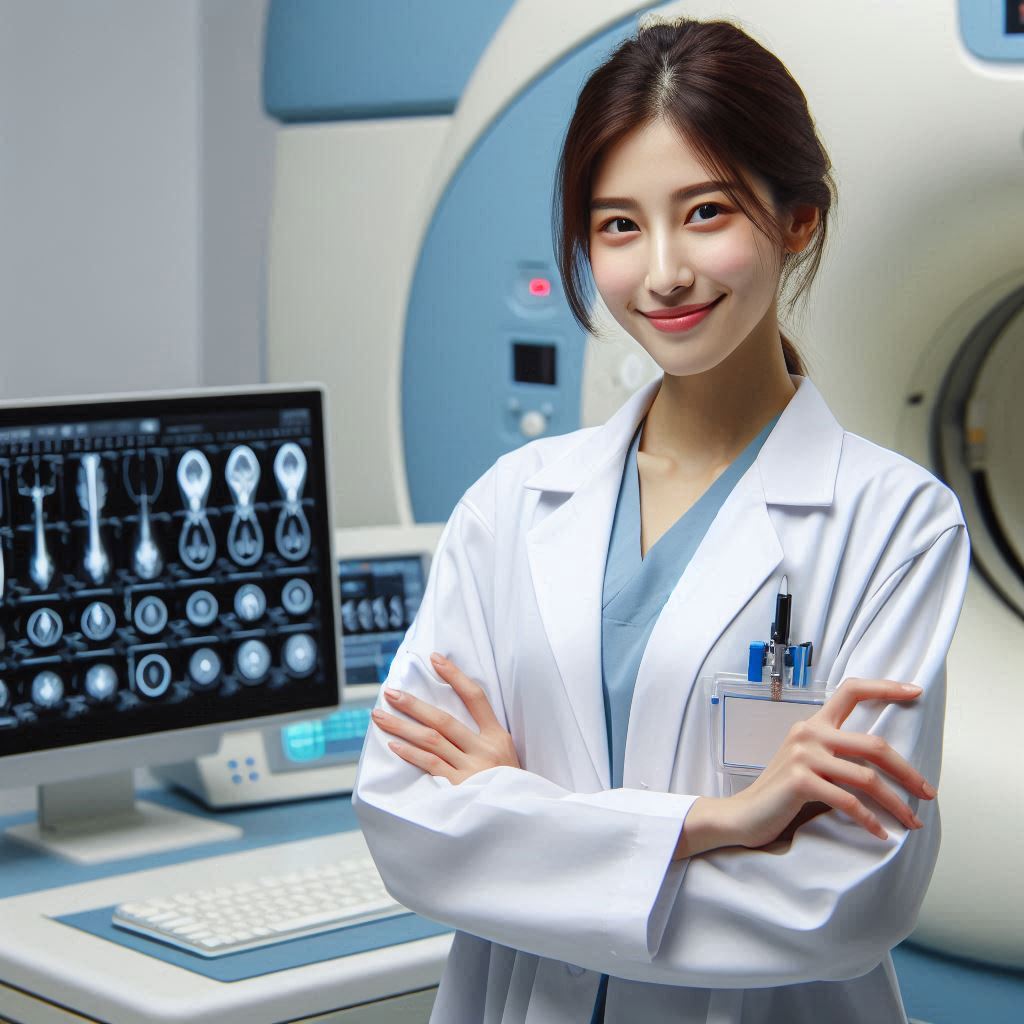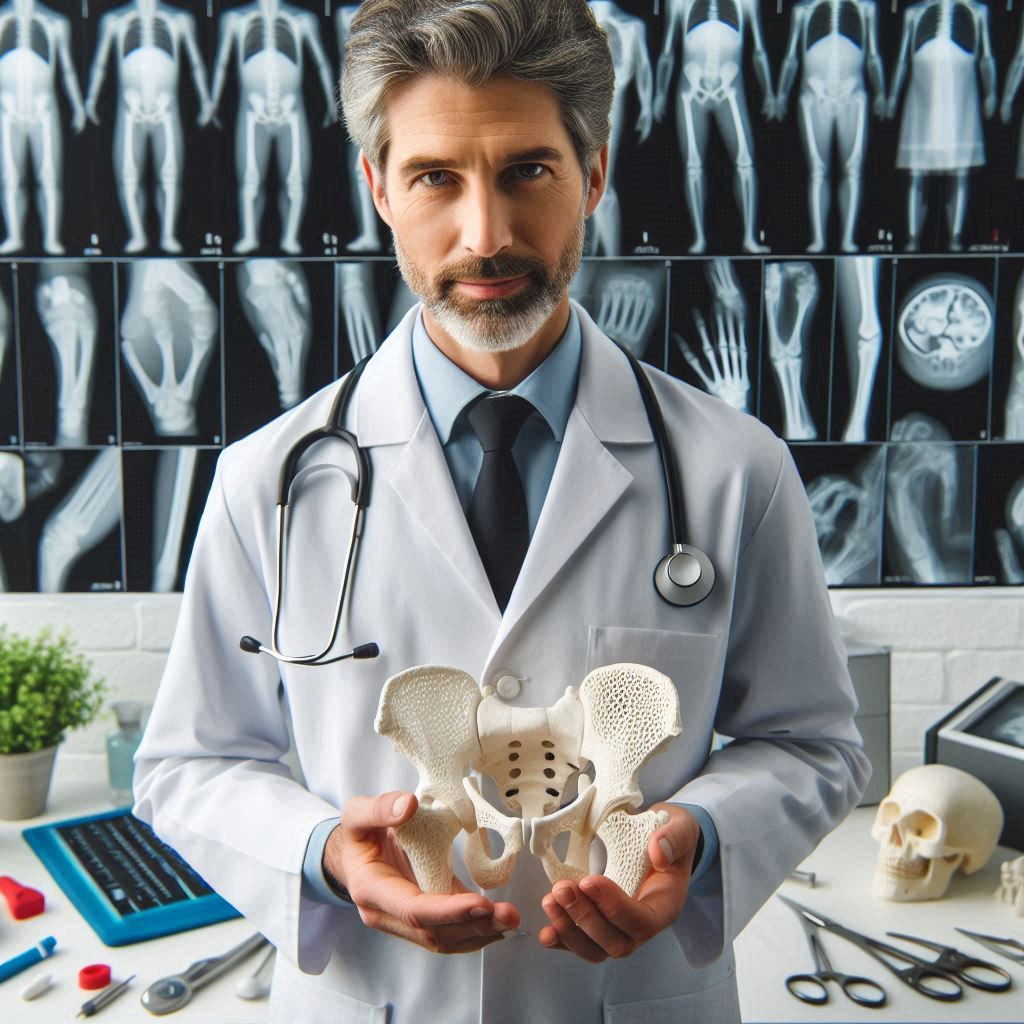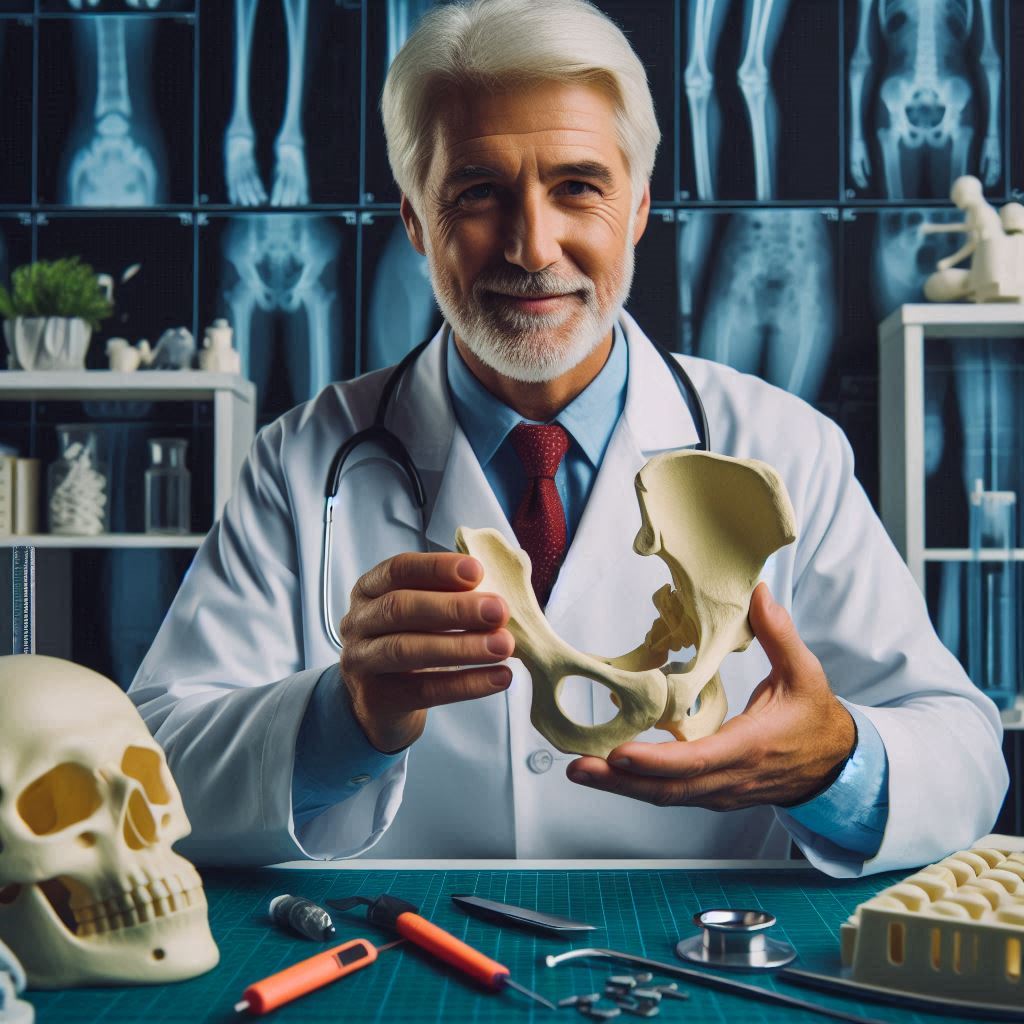Introduction
Nuclear medicine is a specialized branch of medical imaging that uses small amounts of radioactive material to diagnose and treat a variety of diseases.
It plays a crucial role in modern healthcare by providing valuable diagnostic information that can’t be obtained through other imaging techniques.
Nuclear medicine technologists are healthcare professionals who are trained to operate imaging equipment and administer radiopharmaceuticals to patients.
They play a vital role in the field by ensuring the safe and accurate delivery of radioactive materials for diagnostic and therapeutic purposes.
These professionals work closely with radiologists, physicians, and other healthcare team members to obtain high-quality images that help in diagnosing and monitoring various conditions such as cancer, heart disease, and neurological disorders.
They are responsible for explaining procedures to patients, ensuring their safety during imaging exams, and maintaining high standards of radiation safety.
As technology continues to advance in the field of nuclear medicine, technologists are required to stay updated with the latest developments and techniques.
They undergo continuous training and education to enhance their skills and knowledge, ensuring that they can provide the best possible care to patients.
In essence, nuclear medicine technologists play a crucial role in healthcare by helping to diagnose and treat a wide range of medical conditions using innovative imaging technology.
Their expertise and dedication contribute significantly to the quality of patient care and outcomes in the field of nuclear medicine.
What is Nuclear Medicine
What nuclear medicine entails
Nuclear medicine involves the use of radioactive substances for diagnosis and treatment.
It is a branch of medical imaging that uses small amounts of radioactive materials.
These materials are typically injected into the bloodstream, swallowed or inhaled.
Once inside the body, they emit gamma rays that are detected by a special camera.
This camera produces images that help diagnose and treat medical conditions.
Nuclear medicine is a crucial tool in the early detection of various diseases.
It allows healthcare providers to see how organs and tissues are functioning.
Nuclear medicine can help identify abnormalities in the body before symptoms appear.
It plays a significant role in oncology by detecting and staging cancer.
In addition to cancer, nuclear medicine is used to diagnose heart conditions.
Transform Your Career Today
Unlock a personalized career strategy that drives real results. Get tailored advice and a roadmap designed just for you.
Start NowIt can assess blood flow and heart function, guiding treatment decisions.
Furthermore, nuclear medicine is essential in neurology for brain imaging.
It helps in the evaluation of conditions such as Alzheimer’s disease and seizures.
Overall, nuclear medicine is an indispensable part of modern healthcare.
Importance of Nuclear Medicine in Healthcare
Nuclear medicine has revolutionized the field of medicine in various ways.
It provides valuable information about the structure and function of organs.
This helps in the accurate diagnosis and monitoring of diseases.
Nuclear medicine aids in personalized treatment planning for patients.
It allows healthcare providers to tailor therapies based on individual needs.
The use of radioactive tracers in nuclear medicine is safe and effective.
These tracers are quickly eliminated from the body without causing harm.
Nuclear medicine procedures are non-invasive and painless for patients.
They offer a comprehensive view of the body’s internal functioning.
Nuclear medicine plays a vital role in assessing treatment response.
It helps determine the effectiveness of therapies and adjust treatment plans accordingly.
Moreover, nuclear medicine contributes to research and medical advancements.
It enables scientists and healthcare professionals to study disease mechanisms.
In fact, nuclear medicine has a significant impact on healthcare outcomes.
Read: Navigating Job Market as a Nuclear Medicine Technologist
Role of Nuclear Medicine Technologists
Nuclear medicine technologists perform various duties and responsibilities in healthcare settings.
Transform Your Career Today
Unlock a personalized career strategy that drives real results. Get tailored advice and a roadmap designed just for you.
Start NowThey prepare and administer radioactive drugs used for imaging and therapeutic purposes.
Technologists operate specialized equipment to capture images of organs and tissues inside the body.
They ensure that patients are positioned correctly for accurate imaging results.
Technologists follow strict safety protocols to protect themselves and patients from radiation exposure.
Description of Duties and Responsibilities
Nuclear medicine technologists prepare and administer radiopharmaceuticals to patients.
They explain procedures to patients and address any concerns they may have.
Technologists operate sophisticated imaging equipment, such as gamma cameras and PET scanners.
They monitor patients during imaging procedures to ensure their safety and comfort.
Technologists analyze images and provide the results to physicians for diagnosis and treatment planning.
Importance of Their Role in Ensuring Accuracy and Safety
Nuclear medicine technologists play a crucial role in ensuring the accuracy of imaging studies.
They follow standardized protocols to minimize errors and ensure reliable results.
Technologists collaborate with radiologists and other healthcare professionals to interpret imaging findings.
Their attention to detail and technical expertise help in identifying abnormalities and guiding treatment decisions.
By following safety guidelines, technologists protect patients and themselves from unnecessary radiation exposure.
Nuclear medicine technologists are essential members of the healthcare team, responsible for performing vital tasks in nuclear medicine procedures.
Their expertise, attention to detail, and commitment to safety help in providing accurate diagnostic information to physicians.
By following established protocols and guidelines, technologists ensure that patients receive the highest quality care during imaging studies.
Training and Education
Educational requirements to become a nuclear medicine technologist
To become a nuclear medicine technologist, one must typically complete a 2-year associate degree program.
Alternatively, some technologists opt for a 4-year bachelor’s degree in nuclear medicine technology.
In addition to formal education, aspiring nuclear medicine techs must complete clinical internships.
Transform Your Career Today
Unlock a personalized career strategy that drives real results. Get tailored advice and a roadmap designed just for you.
Start NowThese internships provide hands-on training in a real-world healthcare setting.
Importance of specialized training in nuclear medicine technology
Specialized training in areas such as radiation safety and patient care is also essential.
Training in the proper use of equipment and technology specific to nuclear medicine is crucial.
Technologists must also be well-versed in imaging techniques and protocols used in nuclear medicine.
Ongoing education and training are necessary to stay up-to-date with advancements in the field.
Many nuclear medicine technologists pursue certifications to demonstrate their expertise and dedication.
Certification exams assess the technologist’s knowledge and skills in nuclear medicine technology.
Continuing education requirements for maintaining certification ensure technologists are competent professionals.
Read: Ethical Considerations for Nuclear Medicine Techs
Impact on Patient Care
Nuclear medicine technologists play a critical role in improving patient care by
- Performing various diagnostic imaging procedures
- Assisting in the treatment planning process
- Administering radiopharmaceuticals to aid in disease detection
These professionals work closely with physicians to ensure accurate diagnosis and effective treatment.
Contribution to Improved Patient Care
Nuclear medicine technologists contribute to improved patient care by:
- Providing high-quality images for accurate diagnosis
- Ensuring patient safety during imaging procedures
- Monitoring patients for any adverse reactions to radiopharmaceuticals
- Assisting in the development of personalized treatment plans
Examples of Nuclear Medicine Procedures
Nuclear medicine procedures are valuable in accurate diagnosis and treatment planning.
- PET scans help in identifying cancerous tumors
- Bone scans detect fractures and bone infections
- Cardiac stress tests assess heart function and blood flow
- Thyroid scans diagnose thyroid disorders
These examples illustrate the essential role of nuclear medicine technologists in healthcare.
Read: Remote Medical Transcription Jobs: A Guide

Delve into the Subject: Health Educator Internships and Practicum Opportunities
Advancements in Nuclear Medicine Technology
In recent years, the field of nuclear medicine has seen significant technological advancements that have revolutionized the way medical professionals diagnose and treat various illnesses.
These advancements have greatly improved the efficiency and accuracy of nuclear medicine procedures, leading to better patient outcomes and overall healthcare quality.
Introduction of PET/MRI hybrid scanners
One of the most significant advancements in nuclear medicine technology is the introduction of PET/MRI hybrid scanners.
These machines combine the functional imaging capabilities of positron emission tomography (PET) with the high-resolution anatomical imaging of magnetic resonance imaging (MRI).
Transform Your Career Today
Unlock a personalized career strategy that drives real results. Get tailored advice and a roadmap designed just for you.
Start NowThis integration allows for more precise localization of abnormalities and improved diagnostic accuracy.
Development of digital detectors
Another key advancement in nuclear medicine technology is the development of digital detectors.
These detectors are more sensitive and efficient than traditional analog detectors, allowing for higher image quality and reduced radiation exposure for patients.
Digital detectors also have faster processing times, leading to quicker scan results and improved workflow in healthcare settings.
Implementation of artificial intelligence (AI) algorithms
Artificial intelligence algorithms have been increasingly utilized in nuclear medicine to analyze imaging data and assist in diagnosing various medical conditions.
AI technology can detect subtle patterns and abnormalities that may be missed by human practitioners, leading to earlier identification of disease and more tailored treatment plans for patients.
Advancements in radiopharmaceuticals
Advancements in radiopharmaceuticals have also played a significant role in improving nuclear medicine procedures.
New radiotracers with higher specificity and sensitivity have been developed, allowing for more accurate imaging of targeted tissues and organs.
These radiopharmaceuticals have led to better disease detection and monitoring, as well as increased treatment effectiveness in areas such as oncology and cardiology.
Integration of molecular imaging techniques
The integration of molecular imaging techniques, such as single-photon emission computed tomography (SPECT) and PET, has further advanced nuclear medicine technology.
These techniques provide detailed information about cellular and molecular processes within the body, allowing for earlier detection of disease and personalized treatment planning.
The combination of molecular imaging with other imaging modalities has led to a more comprehensive approach to patient care and management.
In general, the advancements in nuclear medicine technology have significantly improved the efficiency and accuracy of diagnostic and therapeutic procedures in healthcare.
From the introduction of hybrid scanners to the development of digital detectors and the implementation of AI algorithms, these technological innovations have enhanced patient care and outcomes.
As the field continues to evolve, it is important for healthcare professionals to stay informed about the latest advancements in nuclear medicine technology and incorporate them into their practice for the benefit of their patients.
Read: Top Medical Transcriptionist Training Programs
Challenges Faced by Nuclear Medicine Technologists
Common challenges faced by nuclear medicine technologists in their daily work
- Limited resources and equipment availability can hinder daily tasks.
- Maintaining radiation safety protocols to ensure staff and patient safety.
- Rapidly changing technology requiring continuous education and training.
- Handling heavy workloads and multitasking in a fast-paced environment.
- Working irregular hours including nights, weekends, and holidays.
Importance of Addressing These Challenges
Ensuring Quality Patient Care
- Addressing challenges leads to improved workflow and patient outcomes.
- Effective communication and teamwork are crucial for optimal patient care.
- Maintaining high standards of practice enhances patient satisfaction and safety.
Professional Development
- Ongoing training and skill development are essential to meet industry standards.
- Challenges provide opportunities for growth and advancement in the field.
- Adapting to new technologies enhances job satisfaction and career progression.
Staff Wellbeing and Retention
- Addressing challenges promotes a positive work environment and reduces burnout.
- Supporting staff through challenges fosters loyalty and job satisfaction.
- Ensuring staff wellbeing improves retention and reduces turnover rates.
Compliance and Regulatory Requirements
- Meeting safety regulations and guidelines is crucial for legal and ethical practice.
- Addressing challenges ensures compliance with state and federal laws.
- Failing to address challenges can lead to fines, sanctions, or legal consequences.
Enhancing Efficiency and Productivity
- Streamlining processes and addressing challenges improve workflow efficiency.
- Effective problem-solving skills enhance productivity and reduce errors.
- Optimizing resources leads to cost savings and improved patient care delivery.
Continuous Quality Improvement
- Identifying and addressing challenges leads to ongoing quality improvement.
- Regular evaluation of practices promotes best practices and patient safety.
- Feedback from staff and patients helps to address challenges and drive improvements.
Conclusion
Nuclear medicine technologists play a crucial role in modern healthcare. Their expertise significantly enhances diagnostic and therapeutic procedures.
They operate sophisticated imaging equipment to visualize the structure and function of organs.
This allows for precise diagnosis and treatment of various conditions.
Nuclear medicine technologists ensure the safe use of radioactive materials.
Transform Your Career Today
Unlock a personalized career strategy that drives real results. Get tailored advice and a roadmap designed just for you.
Start NowThey follow strict protocols to protect patients and themselves from radiation exposure.
Their work helps detect diseases at early stages, leading to better outcomes.
These professionals collaborate with physicians to develop effective treatment plans. They provide critical information that influences medical decisions.
By administering radiopharmaceuticals, they can target specific areas within the body. This targeted approach minimizes damage to healthy tissues.
Nuclear medicine technologists also monitor patients during procedures. They ensure patient comfort and safety throughout the process.
Their skills contribute to the early detection of cancers, heart diseases, and other conditions.
This early detection often means less invasive treatments and faster recoveries.
Moreover, their work extends to therapeutic applications. They use radioactive substances to treat certain cancers and thyroid conditions.
This therapeutic role further underscores their importance in patient care.
Nuclear medicine technologists significantly impact healthcare through their diagnostic and therapeutic expertise.
Their role ensures accurate diagnoses, effective treatments, and enhanced patient outcomes.
Their contributions to early disease detection and treatment make them indispensable in modern medicine.




